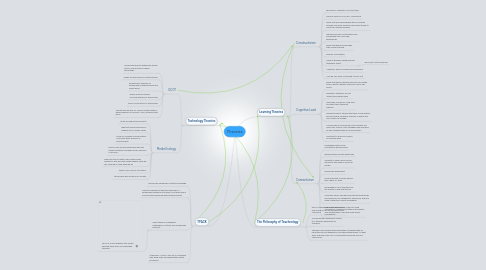
1. Technology Theories
1.1. SCOT
1.1.1. Technology doesn't determine human action, human action shapes technology
1.1.2. Draws on work done in Constructivism
1.1.3. acceptance/ rejection of technology is determined by the social world
1.1.4. Theory used to analyze successes/failure of technology
1.1.5. social construction of technology
1.1.6. Society was hungry for a social media network where people can connect. Thus, facebook was born!
1.2. Media Ecology
1.2.1. Study of media environments
1.2.2. idea that technology plays a leading role in human affairs
1.2.3. Study of complex communication communication systems as environments
1.2.4. theory looks at how interaction with the media facilitates/ impedes human chances of survival
1.2.5. hopes to find out what roles media forces humans to play and how media shapes what we see, how we act and what we do
1.2.6. theory very much in its infancy
1.2.7. technology has influence on society
2. TPACK
2.1. Technology Pedagogy Content Knowledge
2.2. Used to understand/ describe the kinds of knowledge needed by a teacher to be effective in a technology enhanced learning environment
2.3. Three types of knowledge: Pedigogical, Content, and Technology intersect
2.3.1. This is a TPACK diagram that shows how the three areas of knowledge intersect
2.4. A teachers' "TPACK" skill set is something they build upon throughout their entire profession
3. Learning Theories
3.1. Constructivism
3.1.1. the mind is a network of connections
3.1.2. humans learn by ACTIVELY connecting
3.1.3. Belief that one should begin with a complex problem and learn the basic skills while trying to solve the complex problem
3.1.4. learning involves constructing ones knowledge from ones own experiences
3.1.5. Belief that humans build their own unique scaffold
3.1.6. Teacher as facilitator
3.1.7. Project/ problem based learning (authentic tasks)
3.1.7.1. discovery/ active learning
3.1.8. Vygotsky: Zone of Proximal Development
3.1.9. *can be very time consuming to carry out
3.2. Cognitive Load
3.2.1. Belief that human working memory has limited space, learner requires maximum use of this space
3.2.2. Related to attention: do not under/overload the brain
3.2.3. Two kinds of memory: long term and short term (working) memory
3.2.4. Working memory temporarily takes in information for processing, long term memory is where this info is sent for storage
3.2.5. As a teacher it is important not to present too much info at once. Give strategies like chunking to help students take in the information
3.2.6. Important to build on schema you already have
3.3. Connectivism
3.3.1. Knowledge exists in the connections humans build
3.3.2. learning theory for the digital age
3.3.3. capacity to know more is more important than what is currently known
3.3.4. technology dependent
3.3.5. more important to know "where" than "what" or "how"
3.3.6. knowledge is out in the world for the learner to find and explore
3.3.7. Using this theory teachers provide the technology and assistance for students to effectively find and make connections about knowledge
3.3.8. Like constructivism it is critical to make connections, however this theory dominantly uses technology to find and make those connections
